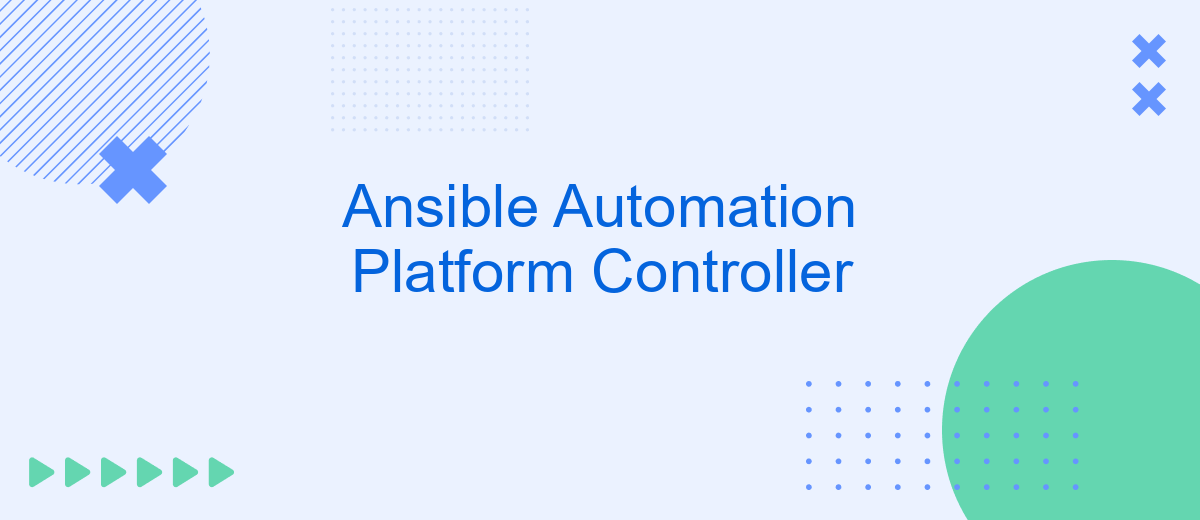The Ansible Automation Platform Controller serves as a central hub for managing and orchestrating automation tasks across diverse IT environments. By integrating powerful automation capabilities with an intuitive user interface, it empowers organizations to streamline complex workflows, enhance operational efficiency, and reduce manual intervention. This article explores the key features, benefits, and practical applications of the Ansible Automation Platform Controller, highlighting its role in modern IT infrastructure management.
Introduction
Ansible Automation Platform Controller is a robust solution designed to streamline and enhance the automation capabilities of enterprises. By centralizing the management of automation processes, it allows organizations to efficiently orchestrate and control various IT tasks across diverse environments. This platform is crucial for ensuring consistency, reducing errors, and accelerating the deployment of applications and services.
- Centralized Management: Offers a unified interface for managing automation tasks.
- Scalability: Supports large-scale deployments across multiple environments.
- Security: Ensures secure execution and management of automation workflows.
- Integration: Seamlessly integrates with existing IT infrastructure and tools.
- Flexibility: Adapts to the unique needs of different organizations and industries.
With the growing complexity of IT environments, the Ansible Automation Platform Controller becomes an indispensable tool for IT teams. It not only simplifies the automation process but also empowers organizations to respond swiftly to business needs. By leveraging this platform, companies can achieve greater operational efficiency and agility, ultimately driving innovation and competitive advantage in the digital landscape.
Key Features

Ansible Automation Platform Controller offers a comprehensive suite of features designed to streamline and enhance automation processes. One of the key features is its intuitive user interface, which simplifies the management of automation workflows. Users can easily create, modify, and monitor tasks using a visual dashboard, making it accessible even to those with limited technical expertise. The platform also supports role-based access control, ensuring that the right people have access to the right resources, thereby enhancing security and compliance.
Integration capabilities are another highlight of the Ansible Automation Platform Controller. It allows seamless connectivity with various third-party services, including SaveMyLeads, which helps automate lead management processes. This integration enables users to effortlessly sync data across platforms, reducing manual input and minimizing errors. Additionally, the platform offers scalable architecture, allowing organizations to expand their automation efforts as their needs grow. With robust reporting and analytics tools, users can gain valuable insights into their automation performance, enabling continuous improvement and optimization.
Benefits

The Ansible Automation Platform Controller offers a robust solution for managing and scaling IT automation across diverse environments. By centralizing control, it simplifies the orchestration of complex workflows, ensuring consistency and efficiency in operations. This platform empowers organizations to accelerate their digital transformation initiatives by providing a unified interface for automation management.
- Centralized Management: Streamlines automation processes by providing a single point of control for all automation activities, reducing complexity and improving oversight.
- Scalability: Designed to handle a wide range of environments, from small setups to large enterprises, ensuring that automation can grow alongside the organization.
- Enhanced Security: Offers role-based access controls and audit trails, ensuring that automation tasks are executed securely and compliance is maintained.
- Integration Capabilities: Seamlessly integrates with existing IT infrastructure and tools, allowing for a smooth transition and minimal disruption to current operations.
- Improved Collaboration: Facilitates better collaboration among IT teams by providing shared access to automation resources and workflows.
By leveraging the Ansible Automation Platform Controller, organizations can achieve greater agility and responsiveness in their IT operations. This results in reduced operational costs, improved service delivery, and a stronger competitive edge in the market. The platform's comprehensive features make it an essential tool for modern IT environments seeking to optimize their automation strategies.
Use Cases

Ansible Automation Platform Controller is a powerful tool used to streamline and manage IT automation processes. It plays a crucial role in simplifying complex tasks and improving operational efficiency across diverse IT environments. By leveraging this platform, organizations can reduce manual intervention, minimize errors, and accelerate the deployment of applications and services.
The platform is particularly beneficial for enterprises looking to enhance their infrastructure management and orchestration capabilities. It provides a unified interface to oversee automation tasks, ensuring consistency and reliability. This not only helps in maintaining compliance with industry standards but also in optimizing resource allocation and utilization.
- Automating cloud provisioning and management, allowing seamless integration with various cloud providers.
- Streamlining configuration management to ensure systems are consistently deployed according to predefined standards.
- Facilitating continuous delivery and deployment processes, enhancing the speed and quality of software releases.
- Enhancing security and compliance by automating vulnerability assessments and patch management.
In conclusion, Ansible Automation Platform Controller serves as a versatile solution for managing IT operations, offering extensive use cases that cater to the dynamic needs of modern enterprises. Its ability to automate and orchestrate complex workflows makes it an invaluable asset for any organization seeking to improve its IT infrastructure and service delivery.
Conclusion
In conclusion, the Ansible Automation Platform Controller offers a comprehensive solution for managing complex IT environments through automation. Its ability to streamline processes, enhance scalability, and improve operational efficiency makes it an invaluable tool for IT professionals seeking to optimize their infrastructure. By facilitating the automation of repetitive tasks, Ansible empowers teams to focus on strategic initiatives, thereby driving innovation and productivity. Its robust suite of features, including role-based access control and analytics, ensures that organizations can maintain security and compliance while achieving their automation goals.
Furthermore, the integration capabilities of Ansible Automation Platform Controller are enhanced by services like SaveMyLeads, which simplify the process of connecting various applications and systems. By leveraging such services, organizations can effortlessly automate data workflows, ensuring seamless communication between disparate systems. This not only reduces the potential for human error but also accelerates the time-to-value for automation projects. As businesses continue to evolve in the digital age, harnessing the power of automation platforms like Ansible will be crucial for staying competitive and responsive to market demands.
FAQ
What is Ansible Automation Platform Controller?
How does Ansible Automation Platform Controller enhance security?
Can Ansible Automation Platform Controller integrate with other tools?
What are the benefits of using Ansible Automation Platform Controller for teams?
How can Ansible Automation Platform Controller help in scaling automation?
If you use Facebook Lead Ads, then you should know what it means to regularly download CSV files and transfer data to various support services. How many times a day do you check for new leads in your ad account? How often do you transfer data to a CRM system, task manager, email service or Google Sheets? Try using the SaveMyLeads online connector. This is a no-code tool with which anyone can set up integrations for Facebook. Spend just a few minutes and you will receive real-time notifications in the messenger about new leads. Another 5-10 minutes of work in SML, and the data from the FB advertising account will be automatically transferred to the CRM system or Email service. The SaveMyLeads system will do the routine work for you, and you will surely like it.
